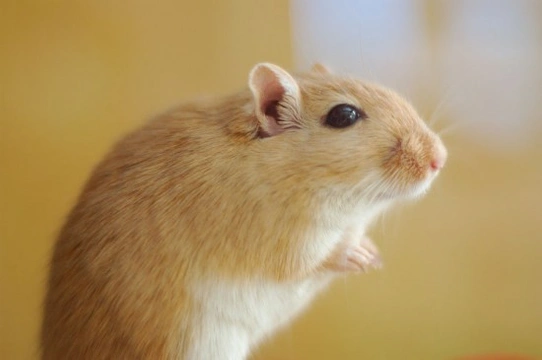
Top tips for Gerbil health
It is a fact that gerbils are the least likely of all rodents to fall ill. It is also a fact that around 90% of gerbils never need veterinary treatment. However this does not mean that we should be complacent. On the contrary we should check our pets every day. It doesn't take long and once you know what you are looking for then it just becomes part of the general routine. In the long run prevention is always better than cure so being able to spot those potential problems straight away is essential.
MY GERBIL IS MISERABLE: This is one of those things that are glaringly obvious and yet it is amazing how many people still say I just thought they were having an off day. But if your gerbil is looking a bit dejected in order to decide whether he is unwell or not also look for any contributing signs: bedraggled fur, especially if it is damp around the hindquarters is a dead giveaway. You may also try offering a sunflower seed. If he does not immediately show an interest in this, then you have a problem and should seek veterinary advice straight away.
HIS NOSE LOOKS A BIT SORE: Your gerbil's nose is a beacon - if it looks sore then the thing to do is to try and determine the cause of the problem and eliminate it. It can be down to a number of things but bedding allergies (cedar bedding in particular) and stress are the two most common. In itself the sore nose is not life threatening but if left unattended it will almost certainly become infected, which will then lead to other health complications. Antibiotic cream will need to be obtained from a veterinary for this. The faster you act the less impact the sore nose will have upon the gerbil's general profile.
HE'S SUDDENLY STOPPED EATING: If there are no other signs of illness then this is more than likely a tooth problem. There is a quick and easy way to test this - offer your gerbil a piece of paper and instinctively he will try to chew it. If the paper remains intact then this is because his teeth are not working properly. Further examination is now required. If you are unable to do this for yourself take the gerbil to a veterinary a.s.a.p. Weight loss occurs rapidly in a gerbil and this is not a good thing. The missing or damaged tooth will grow back. But meanwhile you need to feed soft foods such as baby food or softened bread or biscuit. The complication in all of this arises in the other undamaged teeth which are not being naturally ground down with the usual gnawing action. Check that they do not overgrow. If they do then you will need to have them trimmed by your veterinary.
THE CAGE IS SMELLIER THAN USUAL: All gerbils smell a little bit no matter how fastidious we are in keeping them clean. But that smell should never be unpleasant enough to make you wrinkle your nose. If it does then it may be that he has developed diarrhoea. Lift him gently up and examine around the anus. Is the rectum soiled and is there any staining on the surrounding fur? If the answer is yes then again you need to seek veterinary advice double quick - gerbils rarely get ill from simply over indulging and so upset tummies are often a sign of other more serious illness such as Tyzzer's disease.
HE'S MAKING A STRANGE NOISE: Actually you will have to lift your gerbil up close to your ear for this one because the noise can be very slight and not easily discernible from the cage. But if he is making an odd clicking noise or worse a rasping sound then it is probable that he has got a chest infection. It is important to note here that this happens most frequently in young gerbils just after weaning and older ones that are more susceptible to illness. Prompt treatment with a prescribed antibiotic is necessary to successfully treat an infection of this kind.
HE'S MOVING ODDLY: Sometimes a gerbil develops a head tilt - if he looks a little lop sided then take him to the veterinary for a check-up - it could be he has an inner ear infection or small cyst. Other awkward movements like limping or holding up paws can be any number of things - a sprain or even a break - whilst this sounds shocking it is often best to leave these type of injuries to heal themselves. As long as you make sure the gerbil is not in distress and has access to food and water without having to struggle he should make a full recovery quite quickly. He will though need a little extra care for a few days, just as you would a sick child.
This is not by any means a definitive list but it goes some way to covering the most common gerbil ailments. With gerbils speed is of the essence and although they are hardy little creatures if left any length of time and by this I mean more than a couple of hours, they will quickly become more seriously ill. One of the biggest causes of illness in gerbils is stress. Gerbils are by nature very social animals and when they are separated from other members of their family they will become depressed and more prone to ill health. When a gerbil is poorly one of the worst things you can do is to isolate it from its friends and cage mates. So forewarned as they say is forearmed and hopefully this article will have enabled you to be just that.



